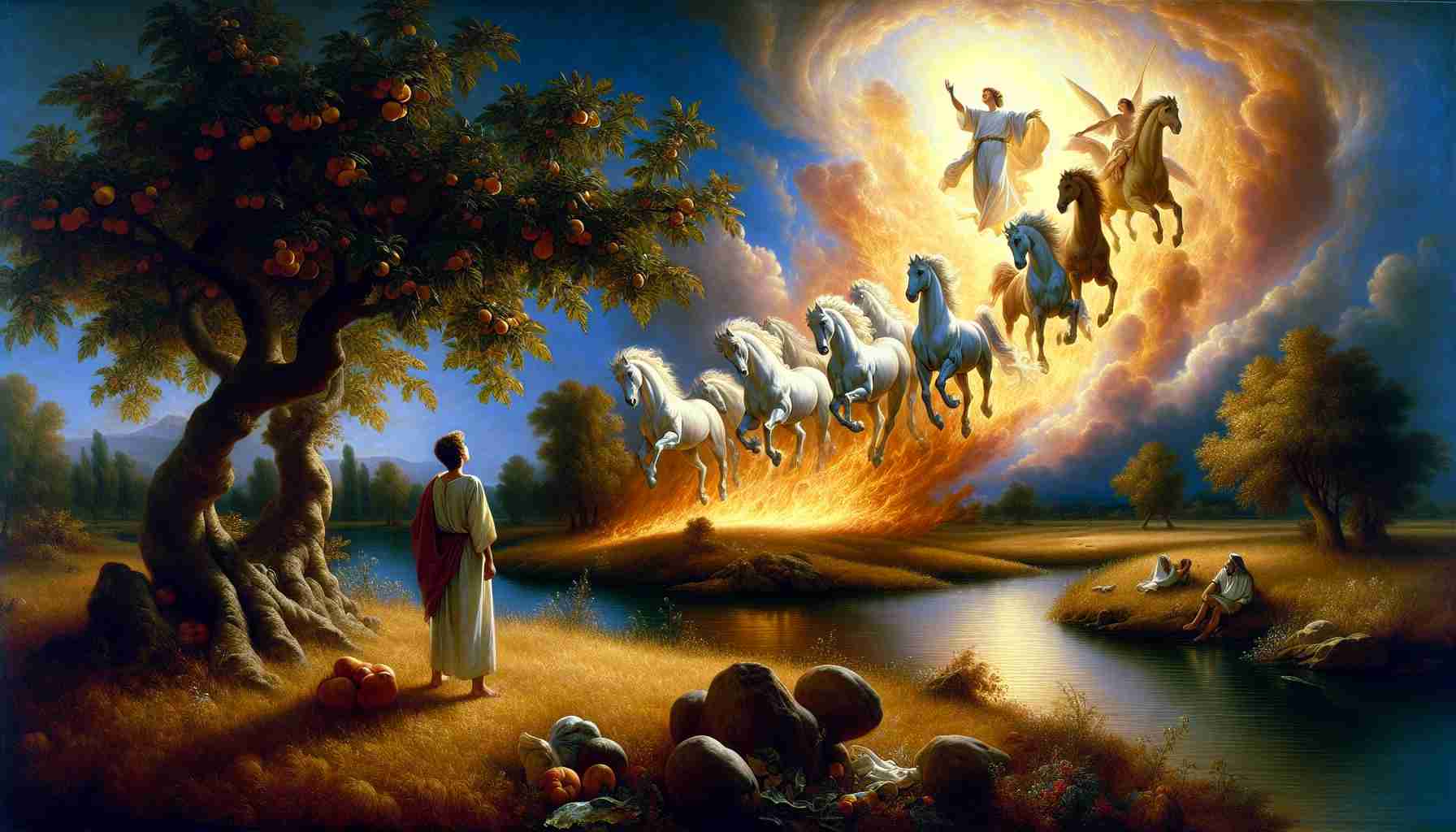

My name’s Micah. I was one of the apprentices learning under the prophet Elijah. I didn’t speak much—I listened. I swept the floors where Elijah taught. I helped fetch water. But I watched everything.
That last morning was strange. The older prophets kept whispering, glancing up at the sky, then back at Elijah with uneasy eyes. Even I could feel something was about to change.
“Elijah’s leaving us today,” one of them said quietly, not knowing I was near. My chest tightened, but I said nothing. Where would he go? Who would lead us?
Elijah was no ordinary man. He was the prophet who called down fire from Heaven to prove that God is the only true God. I’d seen him stand tall before kings and call out injustice without fear. He was fire and wind all at once—and Elisha, his student, followed him like a son.
That day, Elijah walked with Elisha from Gilgal to Bethel, then to Jericho, and finally to the Jordan River. A few of us followed from a distance. I stayed farther back than the others, in awe.
When they reached the Jordan, Elijah rolled up his cloak—his mantle—and struck the water. I froze as the river split open, forming a dry path. It was like reading about Moses again, but I was seeing it with my own eyes. They crossed over, just the two of them.
I waited. My heart beat louder than the wind.
Then it happened.
Fire.
A roar tore through the sky. A storm of wind and flame came down like a tornado, but brighter, more alive. A chariot made of fire, with horses just as blinding, rushed between Elijah and Elisha. It lifted Elijah into the air—higher and higher—spinning, glowing, disappearing into the heavens.
Gone.
Elisha cried out, “My father, my father! The chariot of Israel and its horsemen!" But there was no answer—only the wind.
Then Elisha tore his clothes in grief. A part of me wanted to run. It was too much—too holy. But I stayed.
Slowly, Elisha knelt and picked up Elijah’s mantle—the cloak he had dropped as the chariot lifted him away. He held it in both hands for a long time.
We waited to see if the power had passed on.
Then Elisha walked to the Jordan River, mantle in hand. He struck the water. “Where is the God of Elijah?” he cried.
And the river split.
I couldn’t hold back the tears. Not just for Elijah, who was gone—but for what remained. His spirit lived on.
In that moment, I realized something: God does not leave us empty. When one light is taken, another is lit. That day, the torch passed, and I understood faith was not about staying the same—it was about being ready for change, and trusting God would lead us through it.
I had seen Elijah go up in fire—but I stayed to watch what burned within the one who remained.
My name’s Micah. I was one of the apprentices learning under the prophet Elijah. I didn’t speak much—I listened. I swept the floors where Elijah taught. I helped fetch water. But I watched everything.
That last morning was strange. The older prophets kept whispering, glancing up at the sky, then back at Elijah with uneasy eyes. Even I could feel something was about to change.
“Elijah’s leaving us today,” one of them said quietly, not knowing I was near. My chest tightened, but I said nothing. Where would he go? Who would lead us?
Elijah was no ordinary man. He was the prophet who called down fire from Heaven to prove that God is the only true God. I’d seen him stand tall before kings and call out injustice without fear. He was fire and wind all at once—and Elisha, his student, followed him like a son.
That day, Elijah walked with Elisha from Gilgal to Bethel, then to Jericho, and finally to the Jordan River. A few of us followed from a distance. I stayed farther back than the others, in awe.
When they reached the Jordan, Elijah rolled up his cloak—his mantle—and struck the water. I froze as the river split open, forming a dry path. It was like reading about Moses again, but I was seeing it with my own eyes. They crossed over, just the two of them.
I waited. My heart beat louder than the wind.
Then it happened.
Fire.
A roar tore through the sky. A storm of wind and flame came down like a tornado, but brighter, more alive. A chariot made of fire, with horses just as blinding, rushed between Elijah and Elisha. It lifted Elijah into the air—higher and higher—spinning, glowing, disappearing into the heavens.
Gone.
Elisha cried out, “My father, my father! The chariot of Israel and its horsemen!" But there was no answer—only the wind.
Then Elisha tore his clothes in grief. A part of me wanted to run. It was too much—too holy. But I stayed.
Slowly, Elisha knelt and picked up Elijah’s mantle—the cloak he had dropped as the chariot lifted him away. He held it in both hands for a long time.
We waited to see if the power had passed on.
Then Elisha walked to the Jordan River, mantle in hand. He struck the water. “Where is the God of Elijah?” he cried.
And the river split.
I couldn’t hold back the tears. Not just for Elijah, who was gone—but for what remained. His spirit lived on.
In that moment, I realized something: God does not leave us empty. When one light is taken, another is lit. That day, the torch passed, and I understood faith was not about staying the same—it was about being ready for change, and trusting God would lead us through it.
I had seen Elijah go up in fire—but I stayed to watch what burned within the one who remained.